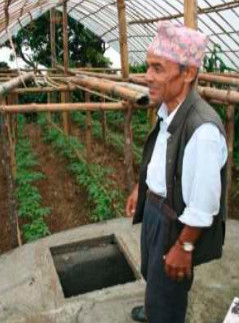Water Portal / Rainwater Harvesting / Business Development - Micro-financing
< Water Portal | Rainwater Harvesting| |
|
|
|
|
|
|
|
|
|
|

Rainwater harvesting receives a lot positive reviews as a sustainable alternative for water supply, but also has its share of negative reviews. The main comment is that rainwater harvesting is too expensive, especially for the rural poor. Initial investment costs are relatively high, since it is a decentralised and small scale water supply option. However, when looking at Life Cycle Costs (LCC) this image is not so negative: for example, rainwater harvesting tanks have an average life span of 20 years. Also, rainwater harvesting can lead to more income, better education and fewer health problems. But who is able and willing to pay the initial investment costs, in spite of the guarantees that LCCs are cheaper and the investment is worth the money?
Requirements & limitations
This article page will consist of RAIN’s experiences in the sustainable financing of rainwater harvesting projects from examples in Senegal, Burkina Faso and Nepal. It will reflect upon these experiences and compare them to other research and practices on rainwater harvesting, micro-finance and business development. NGOs and other users will learn about the opportunities and challenges in changing the financial set-up of rainwater programmes.
Description & results
RAIN has implemented 3 pilots on microcredit and rainwater harvesting since 2010 in Nepal and has carried out feasibility studies on the potential of micro-finance in Burkina Faso and Senegal. In Nepal, RAINs partner BSP-Nepal has succeeded to reduce the subsidy amount by 25%, which is now a small loan. Loans are being repaid and first outcomes are promising. An evaluation was carried out by WASTE in 2012, which showed that micro-finance is indeed a feasible option for financing rainwater harvesting systems. In addition, a Masters student from VU University Amsterdam carried out a more qualitative research on microcredit and rainwater harvesting in Nepal.
Based on this study, RAIN is currently developing a business plan (also see Sustainable Financing Tool) to upscale its activities in Nepal and introduce sustainable ways of financing rainwater harvesting in other country programmes. A short guide (2-3 pages) will be developed based on information from Nepal, Burkina and Senegal. It will showcase RAIN's activities in financing and create a platform for discussion and sharing practices on rainwater harvesting.
Contents
Examples
- PDF: IRC Symposium 2010 Pumps, Pipes and Promises, Micro-credit and Rainwater Harvesting. By Saskia Nijhof, Bala Ram Shrestha. 2010
- Senegal (yet to come)
- Burkina (yet to come)
Documents, videos and links
- VIDEO: http://bspnepalrhcc.org. This video is coming soon.